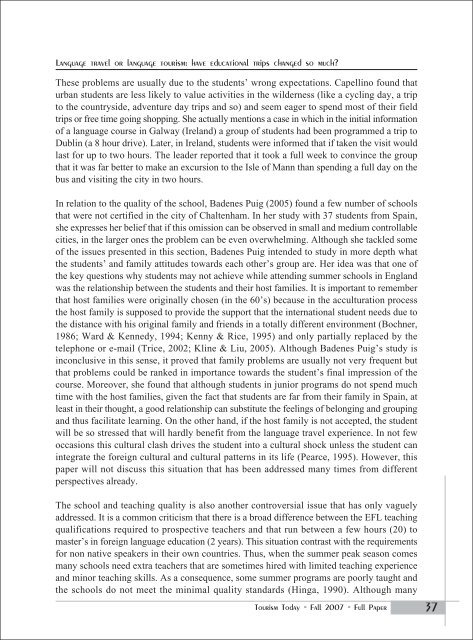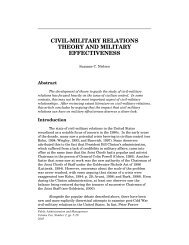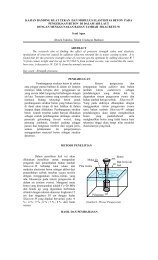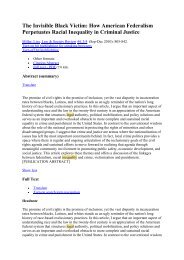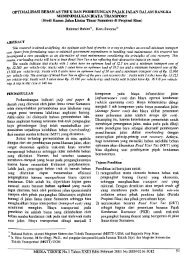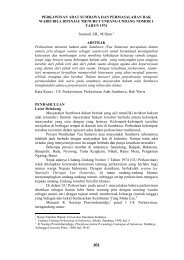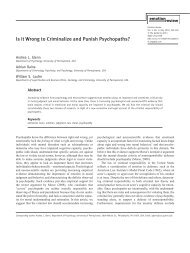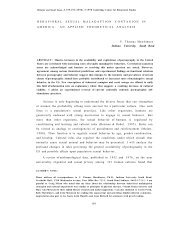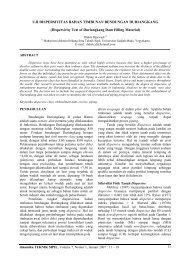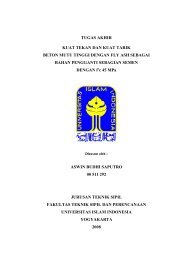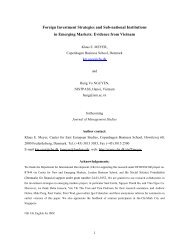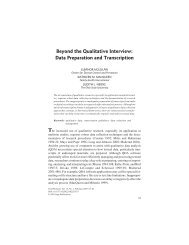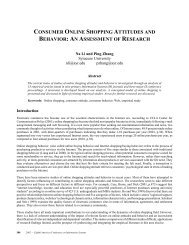Ski – resort and regional development: profile of visitors ... - E-Journal
Ski – resort and regional development: profile of visitors ... - E-Journal
Ski – resort and regional development: profile of visitors ... - E-Journal
Create successful ePaper yourself
Turn your PDF publications into a flip-book with our unique Google optimized e-Paper software.
Language travel or language tourism: have educational trips changed so much?<br />
These problems are usually due to the students’ wrong expectations. Capellino found that<br />
urban students are less likely to value activities in the wilderness (like a cycling day, a trip<br />
to the countryside, adventure day trips <strong>and</strong> so) <strong>and</strong> seem eager to spend most <strong>of</strong> their field<br />
trips or free time going shopping. She actually mentions a case in which in the initial information<br />
<strong>of</strong> a language course in Galway (Irel<strong>and</strong>) a group <strong>of</strong> students had been programmed a trip to<br />
Dublin (a 8 hour drive). Later, in Irel<strong>and</strong>, students were informed that if taken the visit would<br />
last for up to two hours. The leader reported that it took a full week to convince the group<br />
that it was far better to make an excursion to the Isle <strong>of</strong> Mann than spending a full day on the<br />
bus <strong>and</strong> visiting the city in two hours.<br />
In relation to the quality <strong>of</strong> the school, Badenes Puig (2005) found a few number <strong>of</strong> schools<br />
that were not certified in the city <strong>of</strong> Chaltenham. In her study with 37 students from Spain,<br />
she expresses her belief that if this omission can be observed in small <strong>and</strong> medium controllable<br />
cities, in the larger ones the problem can be even overwhelming. Although she tackled some<br />
<strong>of</strong> the issues presented in this section, Badenes Puig intended to study in more depth what<br />
the students’ <strong>and</strong> family attitudes towards each other’s group are. Her idea was that one <strong>of</strong><br />
the key questions why students may not achieve while attending summer schools in Engl<strong>and</strong><br />
was the relationship between the students <strong>and</strong> their host families. It is important to remember<br />
that host families were originally chosen (in the 60’s) because in the acculturation process<br />
the host family is supposed to provide the support that the international student needs due to<br />
the distance with his original family <strong>and</strong> friends in a totally different environment (Bochner,<br />
1986; Ward & Kennedy, 1994; Kenny & Rice, 1995) <strong>and</strong> only partially replaced by the<br />
telephone or e-mail (Trice, 2002; Kline & Liu, 2005). Although Badenes Puig’s study is<br />
inconclusive in this sense, it proved that family problems are usually not very frequent but<br />
that problems could be ranked in importance towards the student’s final impression <strong>of</strong> the<br />
course. Moreover, she found that although students in junior programs do not spend much<br />
time with the host families, given the fact that students are far from their family in Spain, at<br />
least in their thought, a good relationship can substitute the feelings <strong>of</strong> belonging <strong>and</strong> grouping<br />
<strong>and</strong> thus facilitate learning. On the other h<strong>and</strong>, if the host family is not accepted, the student<br />
will be so stressed that will hardly benefit from the language travel experience. In not few<br />
occasions this cultural clash drives the student into a cultural shock unless the student can<br />
integrate the foreign cultural <strong>and</strong> cultural patterns in its life (Pearce, 1995). However, this<br />
paper will not discuss this situation that has been addressed many times from different<br />
perspectives already.<br />
The school <strong>and</strong> teaching quality is also another controversial issue that has only vaguely<br />
addressed. It is a common criticism that there is a broad difference between the EFL teaching<br />
qualifications required to prospective teachers <strong>and</strong> that run between a few hours (20) to<br />
master’s in foreign language education (2 years). This situation contrast with the requirements<br />
for non native speakers in their own countries. Thus, when the summer peak season comes<br />
many schools need extra teachers that are sometimes hired with limited teaching experience<br />
<strong>and</strong> minor teaching skills. As a consequence, some summer programs are poorly taught <strong>and</strong><br />
the schools do not meet the minimal quality st<strong>and</strong>ards (Hinga, 1990). Although many<br />
Tourism Today - Fall 2007 - Full Paper<br />
37


